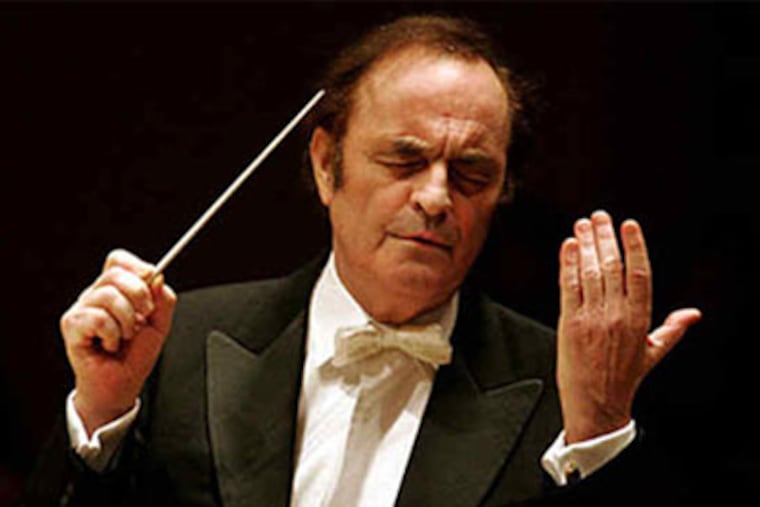
In past contract negotiations at the Philadelphia Orchestra, it has been musicians who have quietly held, or explicitly exercised, the threat of damaging action: a strike.
But in current talks, it is management tolling unprecedented and severe consequences: bankruptcy.
Management has intermittently used the prospect of Chapter 11 in talks during the last few months in its drive to reduce labor costs, people familiar with the talks say.
Players - who could see a 20 percent cut in base pay and the loss of 10 positions - are taking the threat seriously. They would like any eventual deal to include a commitment that management will not seek bankruptcy protection, whose stigma they feel would both damage the orchestra's reputation and dampen fund-raising and ticket sales.
Some orchestra board members are advocating bankruptcy - despite the fact that the group has no debt and an endowment well north of $100 million - because they believe it would allow management to no longer fulfill its pension obligations, board members and others say.
The talks' outcome will be of intense interest to orchestras across the country, as it could be an instance of substantial rollbacks at a major ensemble during recessionary times. The orchestras of Boston, Chicago, Cleveland, and New York have contracts expiring this season or next.
Philadelphia's two sides have been meeting to reach a deal on salary, pension, work rules, size of the ensemble, and other matters as the orchestra's leadership responds to sagging attendance and a budget gap that administrators and board members variously have stated as being from $7 million to $14 million annually.
Administrators have declined to commit to a specific operating deficit figure, or to say how they arrived at it.
While seeking to reduce operating costs, orchestra leaders are simultaneously courting a group of donors who could help increase contributed income with annual support and gifts to the endowment.
Representatives from the management and labor sides of the table declined to speak on the record about talks between the Philadelphia Orchestra Association and Local 77 of the American Federation of Musicians, which recently were joined by a new face, federal mediator Barbara Lichtman.
One recent proposal at the table would put the Philadelphia Orchestra well below its traditional peer groups in Boston, Chicago, Cleveland, and New York - at least for now - in terms of compensation.
Details are still in flux, but if a current $2,000-per-week deal emerged as a tentative agreement and survived a vote by rank-and-file musicians, it would bring players back to the base pay of almost a decade ago and put their salary at the same level of the Detroit Symphony Orchestra at the end of its 2009-10 season. That orchestra has been on strike for 23 weeks.
A $2,000-a-week base in Philadelphia - $104,000 annually - would represent a 20 percent cut from the $131,000 a year players were scheduled to start receiving March 21 under the terms of an earlier agreement.
The base would rise to $2,400 per week by the end of the contract, though when that would be has not been agreed on. Management has proposed a 4½-year contract, players 3½.
(The base salary figure is deceptive, since a large percentage of players - those in titled positions, such as concertmaster and other principal, assistant, and associate players - earn more.)
The size of the ensemble appears poised to shrink.
One proposal, which people familiar with talks say is likely to be approved, would reduce the size of the orchestra by 10 players, to 95 plus two librarians; the complement would rise again by the end of the contract, to a number as yet unsettled. The 10 lost positions would be expected to come from a combination of seats currently unoccupied and expected retirements.
A number of work-rule changes, if approved by the general membership, would save on operating costs - items such as giving management a bank of free overtime minutes for concerts and rehearsals, and lowering the number of vacation weeks from the current minimum of 10.
The Orchestra Association's future willingness to fund the musicians' pension has been a major point of dispute in talks, and one possibility being discussed is reaching a labor deal without a conclusion on pensions, deferring any changes until a task force could explore various options. Also unresolved at this point is whether musicians would be compensated - and if so, how - for electronic media, such as recordings and simulcasts.
Several informal deadlines for reaching an agreement have come and gone. The current date on the horizon is March 21 - the expiration of a memorandum of understanding delaying the musicians' raise to the minimum $131,000.
"They're working very hard and I'm very impressed," said Lichtman, who has some sense of the labor history of the Philadelphia Orchestra. She was brought in to facilitate talks during the orchestra's 64-day strike in 1996.